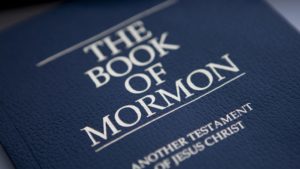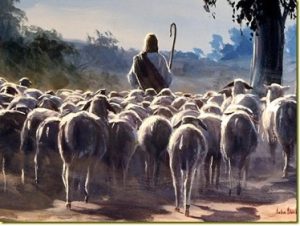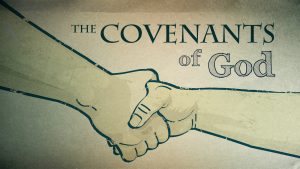The majority of Biblical commentators and preachers take the restoration prophecies about Israel literally, so many Christians today think that the modern-day Republic of Israel is fulfilling Bible prophecies. However, a careful analysis of the Bible, especially the New Testament, shows that this is not the case at all. Please keep in mind, however, that a symbolic or spiritual fulfillment does not mean not real or not true. All Bible prophecies are real and true!
When the first Christians miraculously spoke in foreign languages (Acts 2:1-12), “Some, however, made fun of them and said, ‘they have had too much wine.’ Then Peter stood up with the Eleven, raised his voice and addressed the crowd . . . ‘No, this is what was spoken by the prophet Joel: “In the last days, God says, I will pour out my Spirit on all people”‘” (Acts 2:13-17 NIV). Peter, under God’s direction through the Holy Spirit, applies Joel 2:28-32 about the spirit poured out on all people as being fulfilled right then and there, “In the last days”. Peter’s quote from Joel 2:28,29 was fulfilled on that Pentecost Day, but not literally. Peter (and Luke, the Bible writer) includes this part of Joel’s prophecy also:
“I will show wonders in the heavens above and signs on the earth below, blood and fire and billows of smoke. The sun will be turned into darkness and the moon to blood before the coming of the great and glorious day of the Lord” (Acts 2:19, 20 NIV, which quotes Joel 2:30,31)
There were no literal, physical signs, on Pentecost Day fifty days after Jesus’ resurrection, such as “fire”, “smoke”, ‘sun going dark’, or ‘the moon turned to blood’. This highly figurative language shows that God does indeed intervene in history, and does miraculous things, and that is what is symbolized by the cosmic language of Joel 2:30,31.
“After much discussion” (Acts 15:7 NIV) about the assertion that “Unless you are circumcised, according to the the custom taught by Moses, you cannot be saved” (Acts 15:1 NIV), “James spoke up” (Acts 15:13 NIV). He stated the fact that “God first intervened to choose a people for his name from the Gentiles” (Acts 15:14 NIV). James then quotes Amos 9:11, as an accurate prediction of the reality that “God made a choice . . . that the Gentiles might hear . . . the gospel and believe. God . . . showed that he accepted them by giving the Holy Spirit to them, just as he did to us. He did not discriminate between us and them” (Acts 15:7-9 NIV):
“‘After this I will return and rebuild David’s fallen tent. Its ruins I will rebuild and I will restore it'” (Acts 15:15 NIV).
This restoration prophecy of Israel at Amos 9:11 is clearly applied to the spiritual “Israel of God”, the Christian church comprised of both Jews and Gentiles. “David’s fallen tent” is an obvious reference to fleshly Israel in its Old Covenant relationship with God, which has been “=&0=&. The ‘rebuilding of it’ is the New Covenant relationship of the church, in covenant with God, mediated by Christ (Hebrews 9:15; 1 Timothy 2:5). But there is no literal rebuilding of a fallen tent from ruins, etc! This leads to the main point, as James quotes Amos 9:12 from the Greek Septuagint Version (LXX):
“‘That the rest of mankind may seek the Lord, even all the Gentiles who bear my name, says the Lord, who does these things’—things known from long ago” (Acts 15:16-18 NIV). By quoting both Amos 9:11 and Amos 9:12, James is showing that restoration prophecies of Israel are accomplished by bringing the Gentiles into the Church on an equal status basis with the Jews. The house of David is rebuilt, not with physical Jews, but with spiritual Jews, the Christian “Israel of God” (Galatians 6:15,16 NIV), some of whom are physical Jews, and the rest, the vast majority, are physical Gentiles, non-Jews.
“A person is not a Jew who is one only outwardly, nor is circumcision merely outward and physical. No, a person is a Jew who is one inwardly; and circumcision is circumcision of the heart , by the Spirit, not by the written code” (Romans 2:28,29 NIV). What one is outwardly, in the flesh, no longer matters (Galatians 3:28; Ephesians 2:11-18; Colossians 3:11). These and other NT scriptures give very strong proof that the restoration prophecies about Israel are real, but they are not literal, they are spiritual.
“The ministry Jesus has received is as superior to theirs as the covenant of which he is mediator is superior to the old one, since the new covenant is established on better promises” (Hebrews 8:6 NIV). The New Covenant is thus affirmed to be highly superior to the Old Covenant, “which has been replaced” (2 Corinthians 3:11 NLT). The writer, likely Paul, quotes from Jeremiah’s prophecy to demonstrate the point:
“I will make a new covenant with the people of Israel and with the people of Judah” (Hebrews 8:8 NIV). On the surface, it looks like the New Covenant is made with Jews only. However, by stating that the covenant is made with both Israel and Judah, the fact is emphasized that God’s people will again be united, not divided. We’ve already seen from Romans 2:28,29 (above) that the New Covenant is made with spiritual Jews, not fleshly, Jews. Also, notice:
“Understand, then, those who have faith are children of Abraham. Scripture foresaw that God would justify the Gentiles by faith, and announced the gospel in advance to Abraham: ‘All nations will be blessed through you.’ So those who rely on faith are blessed together along with Abraham, the man of faith” (Galatians 3:7-9 NIV). Taken together, the New Testament scriptures, combined with the prophecies of the Old Testament, clearly show that the restoration prophecies of Israel are fulfilled spiritually, not literally., with the Christian “Israel of God” (Galatians 6:15,16 NIV). “The Church is the true Israel, the recipient of God’s promises, which goes out to all nations in the power of Christ” (New Jerusalem Bible, Pocket Edition, Introduction to Matthew).
Paul said that all Christians, both Jews and Gentiles, who follow the Christian way, comprise “the Israel of God” (Galatians 6:16 NIV).
Peter wrote that Christians:
“Are a chosen people, a royal priesthood, a holy nation, God’s special =&1=&Peter says that Christians are ” a chosen people”, which was predicted by Isaiah: “My people, my chosen” (Isaiah 43:20 NIV).
Peter says Christians are “a royal priesthood, a holy nation, God’s special possession”, which fulfills the prediction at Exodus 19:5,6: ” If you obey me fully and keep my =&2=&(NIV), and Malachi 3:17: “They shall be mine, says the LORD of hosts, my own special possession, when I take action. I will have compassion on them” (NAB).
Why can we say for certain that what was promised to fleshly Israel was given to spiritual Israel?
“The kingdom of God will be taken away from you (fleshly Israel in the Old Covenant) and given to a people who will produce its fruit (spiritual Israel in the New Covenant)” (Matthew 21:43 NIV).
” But you are ‘a chosen race, a royal priesthood, a holy nation, a people of his own, so that you may announce the praises’ of him who called you out of darkness into his wonderful light. Once you were ‘no people’ but now you are God’s people; you ‘had not received mercy’ but now you have received mercy” (1 Peter 2:9,10 NAB). “The prerogatives of ancient Israel mentioned here are now more fully and fittingly applied to the Christian people” (NAB note on 1 Peter 2:9,10).
Peter says that non-Jews they were “once . . . not a people” who had “once not received mercy”, but “now . . . are the people of God”, who “now . . . have received mercy” (1 Peter 2:10 NIV.
This fulfills the predictions of:
“You are not my people, and I am not your God” (Hosea 1:9 NIV).
“Say of your brothers, ‘My people'” (Hosea 2:1 NIV).
“I will say to those called ‘Not my people,’ ‘You are my people’, and they will say, ‘You are my God'” (Hosea 2:23 NIV).
“Obey me, and I will be your God and you will be my people” (Jeremiah 7:23 NIV; also 11:4; 30:22).
“I will cleanse them. They will be my people, and I will be their God” (Ezekiel 37:23 NIV).
These scriptures originally applied to God’s Law Covenant with the people of Israel. However, Peter applies them to the church, made up of spiritual Jews, who are Jews and Gentiles in the flesh (Romans 2:28,29). Peter addressed the letter to Christians living in five provinces of Asia Minor, 1 Peter, which was a largely Gentile area (1 Peter 1:1). We can confirm that Peter was indeed writing to a predominantly Gentile audience from the following scriptures:
“Do not conform to the evil desires you had when you lived in ignorance” (1 Peter 1:14 NIV).
“You were redeemed from the empty way of life handed down to you from your ancestors” (1 Peter 1:18 NIV).
“Called you out of darkness” (1 Peter 2:9 NIV).
“You have spent enough time in the past doing what pagans choose to do—living in debauchery, lust, drunkenness, orgies, carousing and detestable idolatry” ( 1 Peter 4:3 NIV).
Christians, who are mostly Gentiles, “are being built into a spiritual house” (1 Peter 2:5 NIV). God has blessed the church with the blessings promised to “Israel” in the Old Testament (OT)!
Many assert that Romans 11 promises the national restoration of fleshly Israel to God’s special favor, including the land fully restored to Israel, rebuilding Jerusalem and the Temple, and a visible rule of Christ enthroned in Jerusalem. Romans 11 says nothing about any of this. NT writers correctly saw spiritual fulfillment of OT prophecies. John the Baptist fulfilled: “Elijah has already come, and they did not recognize him” (Malachi 4:5,6; Matthew 17:11-13 NIV). The promise to David that his son would establish an eternal kingdom was fulfilled in the resurrection of Jesus (2 Samuel 7:12-16; Acts 2:29-36; 13:29-38). Christians living back then and us today “have already come to Mount Zion, to the city of the living God, the heavenly Jerusalem” (Hebrews 12:22 NIV). The NT interprets OT restoration prophecies as already fulfilled in Christ and the gospel.
“Having disarmed the powers and authorities, he made them a public spectacle of them, triumphing over them by the cross . . . The reality, however, is found in Christ” (Colossians 2:15,17b NIV). Interpreting Old Testament prophecies about Israel’s restoration literally minimizes the important work of Christ in his first coming, and, in effect, shifts major attention from Christ’s first coming to his second coming.
“By this gospel you are saved . . . that Christ died for our sins according to the Scriptures, that he was buried, that he was raised on the third day according to the Scriptures, and that he appeared . . . ” (1 Corinthians 15:2-5 NIV).
“=&3=&







